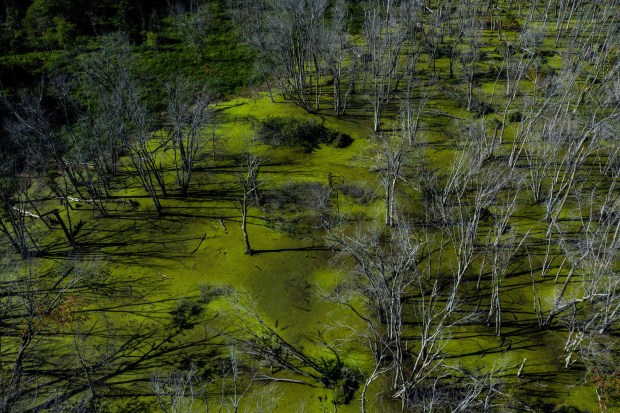As a national department plans to loan hundreds of millions of dollars to build a plastics recycling facility, Northwest Indiana activist groups have concerns about the region’s potential involvement.
Gary Advocates for Responsible Development on Aug. 20 sent a letter to Daniel Killeen, vice president of U.S. Steel’s Gary Works facility, asking whether the company has an agreement with International Recycling Group to ship plastic waste to the facility. GARD is concerned that the company will inject and burn plastic in a blast furnace, according to a Monday news release.
The Department of Energy on July 23 announced a conditional commitment for a loan guarantee of up to $182.6 million for the facility and “an injection system tower at a steel manufacturing facility in northwest Indiana,” according to its website.
U.S. Steel was not specifically named, but GARD member Carolyn McCrady said the DOE has mentioned a portion of the funding will be used to build a 100-foot-tall injection tower and a 100-foot-tall holding silo at the Gary Works plant.
Any announcement about U.S. Steel’s involvement will come from the company, Andrew Fulton, media relations representative, said in a statement.
“We are always seeking ways to improve the environment, increase our recycling efforts and reduce fossil fuel use,” Fulton’s statement said. “Opportunities are reviewed and vetted by our operations and environmental teams based on the safety, environmental and operational merits of any individual project.”
The project is another form of greenwashing, McCrady said, which is making false or misleading statements about a practice’s environmental benefits, according to the Natural Resources Defense Council.
The project plans to create pellets from plastic waste that will be used in steel mills, McCrady said. Burning plastic creates dioxin, which she said is one of the most toxic pollutants humankind has created.
“They’re acting as if it’s OK because they’re not burning coal, they’re burning plastic pellets,” McCrady said. “However, plastic pellets from gas and oil are still burning fossil fuels.”
Northwest Indiana organizations are also concerned about the use of plastic pellets because it increases air pollution and threatens to contaminate Lake Michigan, Indiana Dunes National Park, gardens, natural areas and waterways, according to GARD’s news release.
A group of friends from Chesterton party at Porter Beach in the Indiana Dunes National Park in Porter on Saturday, May 18, 2019.(Zbigniew Bzdak/Chicago Tribune)
The organizations also believe the DOE should focus on reducing plastic production and consumption.
“Rather than addressing the root causes of plastic pollution and climate change, this project will merely replace one form of fossil fuel for another,” Alexis Goldsmith, national organizing director for Beyond Plastics, said in a statement. “And it undermines efforts to tackle the root causes of plastic pollution by fostering an economic model that is dependent on generating more and more plastic waste.”
GARD learned about the project a few weeks ago, McCrady said, and they haven’t received communication from U.S. Steel about their concerns.
Just Transition Northwest Indiana, a local environmental justice organization, also has concerns about U.S. Steel’s potential involvement. The project is replacing one bad thing with another, said Susan Thomas, director of legislation and policy.
“Why are we giving this huge governmental funding … to big oil and gas (companies)?” Thomas asked. “Why are they getting any of this?”
Thomas is specifically worried about how the project could affect the environment, especially at Indiana Dunes National Park. Smog blocks plants’ access to sunlight, Thomas said, so increased pollution could impact photosynthesis.
The national park also brings “massive tourism dollars” to the state, Thomas said, which could be affected if the area has more pollution.
Great Marsh at the Indiana Dunes National Park in Beverly Shores on Thursday, Aug. 23, 2019.(Zbigniew Bzdak/Chicago Tribune)
Indiana Dunes National Park is one of the nation’s 10 most polluted parks, according to a March report from the National Parks Conservation Association. The organization had concerns about air quality conditions, specifically hazy skies and unhealthy air.
“(The national park) is surrounded by polluting industries,” Thomas said. “If you’re planning a trip, and you want to go see the national parks, why would you go to one of the most polluted?”
Thomas is concerned that U.S. Steel hasn’t communicated with residents or organizations about the project, and she wants industries to be more concerned with the region’s wellbeing.
“Northwest Indiana cannot maintain its status as a sacrifice zone,” she said. “Many communities are really trying to pull out of that, and if we band together, I believe that’s possible.”
mwilkins@chicagotribune.com




